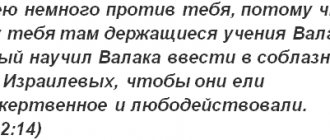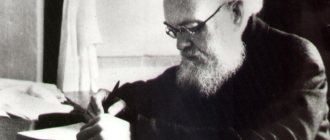About prayer
Student
. Is it possible for all the brothers in the monastery to practice the Jesus Prayer?
Elder . Not only is it possible, but it should be. When tonsured into monasticism, when the newly tonsured person is given a rosary, called the spiritual sword, he is entrusted with unceasing, nightly prayer of the Jesus Prayer 30. Therefore, practicing the Jesus Prayer is the vow of a monk. Fulfilling a vow is an obligation that cannot be renounced.
Old monks told me that at the beginning of this century in the Sarov Hermitage, and probably in other well-maintained Russian monasteries, everyone who entered the monastery was immediately taught the Jesus Prayer. The blessed elder Seraphim, who labored in this desert and achieved great success in prayer, constantly advised all monks to lead an attentive life and practice the Jesus Prayer31. A young man who had completed his studies at a theological seminary visited him and revealed to the elder his intention to enter monasticism. The elder gave the young man the most soul-saving instructions. Among them was a testament to learn the Jesus Prayer. Speaking about her, the elder added: “External prayer alone is not enough. God listens to the mind, and therefore those monks who do not combine external prayer with internal prayer are not monks.”32 The definition is very correct! A monk means a solitary one: whoever has not secluded himself within himself is not yet secluded, he is not yet a monk, even if he lived in the most secluded monastery. The mind of an ascetic, not secluded and not enclosed in himself, is of necessity in the midst of rumors and rebellion produced by countless thoughts that always have free access to him, and he himself wanders painfully, without any need or benefit, harmfully for himself, throughout the universe. A person’s solitude within himself cannot be accomplished otherwise than through attentive prayer, and primarily through the attentive Jesus Prayer. ...The Divine Scripture of the Old Testament lays down the law: “Guard your heart with all care: from these cometh life” (Prov. 4:23). “Take heed to yourself: let not the word of iniquity be hidden in your heart...” (Deut. 15:9) 33. Watching over the heart and cleansing it is especially commanded by the New Testament. All the commandments of the Lord are directed towards this. “First,” says the Lord, “clean the inside of the glass and the dish, so that the outside also may be clean” (Matthew 23:26). The Lord called people here vessels made of fragile glass and low-value clay. “What comes from a person defiles a person: from within from the heart of man come evil thoughts, adultery, fornication, murder, theft, covetousness, insults, deceit, flattery, deceit, the evil eye, blasphemy, pride, madness. All this evil comes from within and defiles a person” (Mark 7:20-23). Saint Barsanuphius the Great says: “if internal work with God, that is, overshadowed by Divine grace, does not help a person, then he strives in vain with external, that is, bodily, asceticism” 34. Saint Isaac of Syria: “he who does not have spiritual work is deprived of spiritual gifts.” 35.
...I remember: when I was young, some pious laymen, even from the nobility, who led a very simple life, were engaged in the Jesus Prayer. This precious custom, now, with the general weakening of Christianity and monasticism, has almost been lost. Praying in the name of the Lord Jesus Christ requires a sober, strictly moral life, the life of a wanderer, requires the abandonment of addictions, but we have become necessary for absent-mindedness, extensive acquaintance, satisfaction of our many whims, benefactors and benefactors, “Jesus turned away, the people are in the place” (John 5 :13).
Student
. The consequence of what has been said will not be the conclusion that without practicing the Jesus Prayer, salvation cannot be achieved?
Elder . Fathers don't say this. On the contrary, the Venerable Nilus of Sora, referring to the Hieromartyr Peter of Damascus, asserts that many, having not achieved dispassion, were honored to receive remission of sins and salvation. 36. Saint Hesychius, having said that without sobriety there is no possibility of avoiding sin “in thoughts,” called blessed and those who abstain from sin “in practice.” He called them rapists of the kingdom of heaven 37. Achieving dispassion, sanctification, or, what is the same, Christian perfection, without acquiring mental prayer is impossible, all the Fathers agree on this...
Student
. The trend of modern monasticism, in which the practice of the Jesus Prayer is very rare, can it serve as an excuse and justification for me if I do not practice it?
Elder . A duty remains a duty and an obligation an obligation, even if the number of those who do not fulfill it has increased even more. The vow is pronounced by everyone. Neither the multitude of vow-breakers nor the custom of breaking gives legitimacy to the breaking. Few are the flock to which the Heavenly Father was pleased to grant the kingdom (Luke 12:32). There are always few travelers on a narrow path, and many on a wide path. (Matt. 7:13–14). In the last times, almost everyone will abandon the narrow path, almost everyone will take the wide one. It does not follow from this that the wide will lose its ability to lead to destruction, that the narrow will become superfluous, unnecessary for salvation. Anyone who wants to be saved must certainly adhere to the narrow path positively bequeathed by the Savior.
Student
. Why do you call the exercise of the Jesus Prayer a narrow path?
Elder . How is it not a narrow path? A narrow path, in the exact sense of the word! Anyone who wants to successfully engage in the Jesus Prayer must protect himself both externally and internally with the most prudent, most cautious behavior: our fallen nature is ready to betray us every hour, to betray us; fallen spirits, with special fury and deceit, instigate the exercise of the Jesus Prayer. Often, from an apparently insignificant carelessness, from the negligence and arrogance of the unnoticed, an important consequence arises that has an impact on the life, on the eternal fate of the ascetic -
“And if the Lord had not helped me, my soul would have entered hell. …My foot is moved: Thy mercy, O Lord, helpeth me” (Ps. 93:17-18).
The basis for practicing the Jesus Prayer is prudent and careful behavior. Firstly, you must eliminate from yourself effeminacy and carnal pleasures in all forms. One must be content with food and sleep that is always moderate, commensurate with one’s strength and health, so that food and sleep provide the body with proper reinforcement, without producing indecent movements, which come from excess, and without producing exhaustion, which comes from lack. Clothing, housing and all material accessories in general should be modest, in imitation of Christ, in imitation of His Apostles, in following their spirit, in communion with their spirit. The Holy Apostles and their true disciples did not make any sacrifices to vanity and vanity, according to the customs of the world, and did not enter into any communication with the spirit of the world. The correct, grace-filled action of the Jesus Prayer can only vegetate from the Spirit of Christ; it vegetates and grows exclusively on this soil alone. Sight, hearing and other senses must be strictly guarded so that through them, like through a gate, adversaries do not break into the soul. The mouth and tongue must be curbed, as if shackled in silence; idle talk, verbosity, especially ridicule, gossip and slander are the worst enemies of prayer... We must resolutely abandon vain curiosity and inquisitiveness, turning all curiosity and all research to research and study of the path of prayer. This path needs the most careful research and study: it is not only a “strait path,” but also a path that “leads you into the belly” (Matthew 7:14); He is the science of the sciences, and the art of the arts. That is what the Fathers call him 38.
The path of true prayer becomes incomparably closer when the ascetic enters upon it through the activity of the inner man. When will he enter these gorges and feel the correctness, the saving power, the necessity of such a situation; when labor in the inner cage becomes desirable for him, then the tightness of outer living will also become desirable, as serving as an abode and repository for internal activity. “He who has entered into the feat of prayer with his mind must renounce, and constantly renounce, both all thoughts and sensations of fallen nature, and all thoughts and sensations brought by fallen spirits, no matter how plausible those and other thoughts and sensations may be; he must constantly walk the narrow path of attentive prayer, not deviating either to the left or to the right. By deviation to the left I mean abandoning prayer with the mind to converse with vain and sinful thoughts; I call deviation to the right the abandonment of prayer by the mind for a conversation with thoughts, apparently good. Four kinds of thoughts and sensations act on the person praying: some vegetate from the grace of God, planted in every Orthodox Christian through holy baptism, others are offered by the Guardian Angel, others arise from fallen nature; finally, others are caused by fallen spirits. The first two types of thoughts, or rather, memories and sensations contribute to prayer, enliven it, increase attention and the feeling of repentance, produce tenderness, crying of the heart, tears, expose before the eyes of the praying person the vastness of his sinfulness and the depth of human fall, announce the death that is inevitable by anyone, about obscurity her hour, about the impartial and terrible judgment of God, about eternal torment, whose cruelty exceeds human comprehension. In the thoughts and sensations of a fallen nature, good is mixed with evil, and in demonic ones, evil is often hidden behind good, although sometimes acting as open evil. Of the last two kinds, thoughts and sensations act together, due to the connection and communication of fallen spirits with fallen human nature, and the first fruit of their action is arrogance, and in prayer - absent-mindedness. Demons, bringing supposedly spiritual and high understandings, distract them from prayer, produce vain joy, pleasure, self-satisfaction, as if from the discovery of the most mysterious Christian teaching. Following demonic theology and philosophy, vain and passionate thoughts and dreams invade the soul, plunder, destroy prayer, and destroy the good order of the soul. According to the fruits, thoughts and feelings that are truly good are distinguished from thoughts and feelings that are supposedly good.
Oh, how rightly the Fathers call the exercise of the Jesus Prayer and the narrow path, and self-denial, and renunciation of the world!39. These virtues belong to any attentive and reverent prayer, especially to the Jesus Prayer, which is alien to the diversity in form and the multiplicity of thoughts that belong to psalmody and other prayers40.
Student
. What words does the Jesus Prayer consist of?
Elder . It consists of the following words: “Lord Jesus Christ, Son of God, have mercy on me a sinner.” Some Fathers41 divide the prayer, for beginners, into two halves, and command from the morning until about lunchtime to say: “Lord Jesus Christ, have mercy on me,” and after lunch: “Son of God, have mercy on me.” This is an ancient legend. But it is better to get used, if possible, to pronouncing a complete prayer. The division was allowed out of condescension for the weakness of the weak and beginners.
Student
. Is the Jesus Prayer mentioned in Holy Scripture?
Elder . It is spoken about in the Holy Gospel. Do not think that it is a human institution: it is a Divine institution. Our Lord Jesus Christ Himself established and commanded the most sacred Jesus Prayer. After the Last Supper, at which the greatest of the Christian sacraments was created - the Holy Eucharist, the Lord, in a farewell conversation with His disciples, before going to terrible suffering and death on the cross for the redemption of lost humanity, taught the most sublime teaching and the most important, final commandments. Between these commandments, He gave permission and commandment to pray in His name42.
“Amen, amen, I say to you,” He said to the Apostles, “that whatever you ask of the Father in My name, He will give it to you” (John 16:23). “Whatever you ask from the Father in My name, that I will do; may the Father be glorified in the Son. And whatever you ask in My name, I will do it” (John 14:13-14). “Until now, do not ask for anything in My name: ask and you will receive, that your joy may be filled” (John 16:24). The greatness of the name of the Lord Jesus Christ was foretold by the Prophets. Pointing to the redemption of men through the God-man, Isaiah cries out: “Behold my God, my Savior!... Draw water with joy from the fountain of salvation! And he said on the day: Praise the Lord, sing praises to His name: ... remember that His name is exalted; Praise the name of the Lord, for you have done great things” (Is. 12:2-5.). “The way of the Lord is judgment: we will trust in Your name, and remember, this is what our soul desires” (Is. 26:8). In accordance with Isaiah, David predicts: “We will rejoice in Your salvation, and in the name of the Lord our God we will be magnified... We will call on the name of the Lord our God” (Ps. 19:6, 8). “Blessed are the people who lead the cry, who have mastered the mental prayer: Lord, in the light of Your face they will walk, and in Your name they will rejoice all day long, and in Your righteousness they will be exalted” (Ps. 89:16-17).
Student
. What is the power of the Jesus Prayer?
Elder . In the Divine name of the God-man, our Lord and God, Jesus Christ. The Apostles, as we see from the book of Acts and from the Gospel, performed great miracles in the name of the Lord Jesus Christ: they healed ailments that were incurable by human means, raised the dead, commanded demons, cast them out from people possessed by them...
Student
. Some argue that practicing the Jesus Prayer will always, or almost always, result in delusion, and they strongly forbid practicing this prayer.
Elder . In the assimilation of such a thought and in such a prohibition lies terrible blasphemy, lies a deplorable charm. Our Lord, Jesus Christ, is the only source of our salvation, the only means of our salvation; His human name borrowed from His Divinity the unlimited, all-holy power to save us; how can this power that acts for salvation, this only power that bestows salvation, be perverted and act in destruction? This makes no sense! This is a sad, blasphemous, soul-destroying absurdity! Those who have adopted such a way of thinking are definitely in demonic delusion, deceived by a false mind that came from Satan. Satan has insidiously rebelled against the all-holy and magnificent name of our Lord Jesus Christ, uses human blindness and ignorance as his weapon, slandered the name,
“more than any name. In the name of Jesus every knee will bow, those in heaven and on earth and under the earth” (Phil. 2:9-10). Those who prohibit praying the Jesus Prayer can respond with the words of the apostles Peter and John to a similar prohibition made by the Jewish Sanhedrin: “Whether it is righteous before God, listen to you rather than judge God.” The Lord Jesus commanded to pray in His all-holy name, He gave us a priceless gift; What significance can a human teaching have that contradicts the teaching of God, a human prohibition that tends to eliminate and destroy the command of God, to take away a priceless gift? It is dangerous, very dangerous, to preach a doctrine contrary to the doctrine preached in the Gospel. Such an undertaking is an arbitrary separation of oneself from the grace of God, according to the testimony of the Apostle (Gal. 1:8)…
Student
. However, the Holy Fathers greatly warn those who practice the Jesus Prayer against delusion.
Elder . Yes, they warn. They warn against delusion both those who are in obedience, and those who are silent, and those who fast - in a word, everyone who practices any kind of virtue. The source of delusion, like all evil, is the devil, and not any virtue. “We must observe with all caution,” says Saint Macarius the Great, “the intrigues, deceptions and evil actions being arranged by the enemy (the devil) from all sides. Just as the Holy Spirit, through Paul, serves all things to all men (1 Cor. 9:22), so the evil spirit evilly tries to be all things to all men, in order to bring everyone down to destruction. With those who pray, he pretends to be praying, so as to make him arrogant about prayer; He fasts with those who are fasting in order to seduce them with self-conceit and drive them into a frenzy; with those knowledgeable in the Holy Scriptures, and he rushes into the study of Scripture, apparently seeking knowledge, but in essence trying to lead them to a false understanding of Scripture; with those who have been worthy of the illumination of light, he also appears to have this gift, as Paul says:
“Satan is transformed into an angel of light” (2 Cor. 11:14), so that he can be deceived by an apparition of light, so as to attract him to himself. It’s simple to say: he takes upon himself all sorts of forms for everyone, so that by an action similar to the action of good, he can enslave the ascetic for himself, and, covering himself with appearances, overthrow him into destruction. 43. I happened to see elders who were engaged exclusively in intense physical feats, and who came from him into the greatest conceit, the greatest self-delusion. Their spiritual passions - anger, pride, deceit, disobedience - received extraordinary development. Selfishness and selfishness completely prevailed in them. They decisively and bitterly rejected all the most soul-saving advice and warnings of confessors, abbots, even saints: they, trampling on the rules of not only humility, but also modesty, decency itself, did not stop expressing disdain for these persons in the most arrogant way.
A certain Egyptian monk at the beginning of the 4th century became a victim of the most terrible demonic delusion. Initially, he fell into arrogance, then, due to arrogance, he came under the special influence of an evil spirit. The devil, based on the arbitrary arrogance of the monk, took care to develop this ailment in him, so that, through his matured and strengthened arrogance, he could finally subjugate the monk to himself and involve him in the destruction of his soul. Helped by the demon, the monk achieved such disastrous success that he stood with his bare feet on hot coals, and, standing on them, read the entire Lord’s Prayer “Our Father.”
Of course, people who did not have spiritual reasoning saw in this action a miracle of God, the extraordinary holiness of the monk, the power of the Lord’s Prayer, and glorified the monk with praise, developing pride in him and helping him to destroy himself. There was neither a miracle of God nor the holiness of the monk here; the power of the Lord’s Prayer did not work here, Satan acted here, based on man’s self-delusion, on his falsely directed will, here demonic delusion was at work...
Student
. What is it in a person, what condition in himself, that makes him capable of delusion?
Elder . St. Gregory of Sinaite says: “In general, one cause of delusion is pride.” 44. In human pride, which is self-deception, the devil finds a convenient refuge for himself, and adds his seduction to human self-deception. Every person is more or less prone to prelest: because “the purest human nature has something proud in itself” 45.
The warnings of the fathers are sound! You must be very careful, you must protect yourself very much from self-delusion and charm. In our time, with the complete impoverishment of God-inspired mentors, we need special caution, special vigilance over oneself. They are needed for all monastic feats; they are most needed during the feat of prayer, which of all feats is the most sublime, the most soul-saving, and the most maligned by enemies46. “Live with fear” (1 Peter 1:17), bequeaths the Apostle. The exercise of the Jesus Prayer has its own beginning, its own gradualness, its own endless end. It is necessary to begin the exercise from the beginning, and not from the middle and not from the end. His Holiness Callistus, Patriarch of Constantinople, depicting the spiritual fruits of this prayer, says: “none of those who have not been taught the mysteries or of those who demand milk, having heard the high teaching about the grace-filled effect of prayer, yes don't dare touch him. Such an untimely attempt is prohibited. Those who have encroached on it, and have sought prematurely what comes in due time, and are trying to ascend to the haven of dispassion in a dispensation that does not correspond to it, are recognized by the Fathers as nothing other than those who are in insanity. It is impossible to read books to someone who has not learned to read and write” 47.
Student
. What does it mean to begin the exercise of the Jesus Prayer from the middle and the end, and what does it mean to begin this exercise from the beginning?
Elder . Those beginners begin in the middle, who, having read in the Fathers’ writings the instructions for practicing the Jesus Prayer, given by the Fathers to the silent ones, that is, to monks who have already been very successful in monastic feats, thoughtlessly accept this instruction to guide their activities. Those who, without any preliminary preparation, begin with their minds to ascend into the temple of the heart and from there send up prayer begin from the middle. Those who seek to immediately reveal within themselves the gracious sweetness of prayer and its other grace-filled effects begin at the end. One must start from the beginning, that is, perform prayer from
“attention” and “reverence”, with the goal of “repentance”, caring only about the fact that these three qualities are constantly present in prayer. So Saint John Climacus, this great worker of heartfelt prayer with grace, prescribes attentive prayer to those who are in obedience, and heartfelt prayer to those who are ripe for silence. For the former, he recognizes prayer that is alien to absent-mindedness as impossible, and from the latter he demands such prayer 48. In human society, one must pray with one’s mind, and in private - both with one’s mind and lips, somewhat aloud to oneself 49. Special care, the most careful care, must be taken for improving morality in accordance with the teachings of the Gospel. Experience will not be slow to reveal to the mind of the person praying the closest connection between the commandments of the Gospel and the Jesus Prayer. These commandments serve for this prayer what oil serves for a burning lamp; without oil the lamp cannot be lit; when the oil becomes depleted, it cannot burn: it goes out, spreading stinking smoke around itself... True silence consists in the Jesus Prayer internalized to the heart - and some of the Holy Fathers accomplished the great feat of heartfelt silence and seclusion, surrounded by human rumor50. Only on morality, brought into order by the Gospel commandments, only on this solid stone of the Gospel, can a majestic, sacred, immaterial temple of God-pleasing prayer be erected. The work of one who builds on the arctic fox is in vain: on an easy, wavering morality (Matthew 7:26). Morality, brought into a harmonious, splendid order, strengthened by skill in fulfilling the Gospel commandments, can be likened to an indestructible silver or golden vessel, which alone is capable of worthily receiving and safely preserving within itself the priceless, spiritual myrrh: prayer.
Saint Simeon the New Theologian, speaking about the occasional failure of prayer asceticism and the tares of delusion that arise from it, attributes the cause of both failure and delusion to the failure to maintain correctness and gradualism in the ascetic endeavor. “Those who want to ascend,” says the Theologian, “to the heights of prayerful success, should not begin to go from top to bottom, but should ascend from bottom to top, first to the first step of the ladder, then to the second, then to the third, and finally to the fourth. In this way anyone can rise from the earth and ascend to heaven. Firstly
, he must strive to tame and diminish passions.
Secondly
, he must practice psalmody, that is, oral prayer;
when the passions subside, then prayer, naturally bringing joy and sweetness to the tongue, is considered pleasing to God. Thirdly
, he must engage in mental prayer.”
Here, of course, is prayer performed with the mind in the heart; The attentive prayer of beginners, with the sympathy of the heart, the Fathers rarely deign to call mental prayer, classifying it more as oral. Fourthly
, it must go back to the vision. The first is the property of the beginners; second - growing in prosperity; third – those who have achieved extreme prosperity; fourth – perfect.” Further, the Theologian says that those who struggle to reduce passions must learn to guard their hearts and to attentively pray the Jesus Prayer, which corresponds to their disposition51. In the dormitories of Pachomius the Great, which produced the most exalted practitioners of mental prayer, each new entrant into the monastery was, firstly, occupied with bodily labor under the guidance of an elder for three years. Through bodily labors, frequent instructions from the elder, daily confession of external and internal activities, and cutting off the will, passions were powerfully and quickly curbed, and significant purity was brought to the mind and heart. While practicing the labors, the novice was taught how to perform prayer in accordance with his dispensation. After three years, beginners were required to study by heart the entire Gospel and the Psalter, and for capable students, the entire Holy Scripture, which unusually develops oral, attentive prayer. After this, the secret teaching of mental prayer began; it was explained abundantly by both the New and Old Testaments 52. In this way, the monks were introduced to the correct understanding of mental prayer and the correct exercise of it. From the strength of the foundation and from the correctness of the exercise, the success was marvelous 53.
Student
. Is there any sure way to protect oneself from delusion in general, during all monastic endeavors, and, in particular, when practicing the Jesus Prayer?
Elder . Just as pride is generally the cause of delusion, so humility - a virtue directly opposite to pride - serves as a sure warning and protection from delusion. Saint John Climacus called humility “the destruction of passions”54. It is obvious that in someone in whom passions do not operate, in whom passions are curbed, delusion cannot operate, because “delusion is a passionate or biased deviation of the soul towards lies on the basis of pride.”
When practicing the Jesus Prayer, and prayer in general, it completely and faithfully protects the form of humility called “crying.” Crying is a heartfelt feeling of repentance, saving sadness over the sinfulness and varied, numerous weaknesses of man. Weeping is “a broken spirit, a contrite and humble heart, which God will not despise” (Ps. 50:19), that is, it will not give over to the power and reproach of demons, as a proud heart, filled with conceit, arrogance, and vanity, gives over to them. Crying is the only sacrifice that God accepts from the fallen human spirit, until the renewal of the human spirit by the Holy Spirit of God. May our prayer be imbued with a feeling of repentance, may it be coupled with crying, and may delusion never affect us. Saint Gregory of Sinaite, in the last article of his work55, in which he set out prayers for ascetics to warn against soul-destroying delusion, says: “It is no small work to achieve the exact truth, and to become clean from everything that is contrary to grace, because it is usual to show the devil, especially before beginners their charm in the image of truth, giving the evil one the appearance of the spiritual. For this reason, one who strives in silence to achieve pure prayer must walk the mental path of prayer with much trembling and weeping, asking for instruction from the skilled, always crying over his sins, grieving and fearing, lest he be subjected to torment, or fall away from God, not to be separated from Him in this or the next age. If the devil sees that the ascetic lives deplorably, he does not stay with him, not tolerating the humility that comes from crying... A great weapon is to have weeping when praying. Unpretentious prayer consists of warmth with the Jesus Prayer, which (the Jesus Prayer) puts fire into the earth of our hearts, in warmth, burning passion like thorns, producing joy and tranquility in the soul. This warmth does not come from the right or left side, and not from above, but vegetates in the very heart, like a source of water from the Life-giving Spirit 56. Love to find and acquire it alone in your heart, keeping your mind ever-undreamy, alien to understandings and thoughts, and don't be afraid. He who said: “Be of good cheer, I am, do not be afraid” (Matthew 14:27), He is with us. He is the One we are looking for. He will always protect us - and we should not be afraid or sigh when calling on God. If some have gone astray by undergoing mental damage, then know that they were subjected to this out of self-indulgence and arrogance.” Nowadays, due to the complete impoverishment of spirit-bearing mentors, the ascetic of prayer is forced to be guided exclusively by the Holy Scriptures and the writings of the Fathers 57. This is much more difficult. A new reason for crying!
Preface.
There are many among you who do not know what the inner work of a God-thought person is, and also do not understand what God-thought is, and who know nothing about prayer created by the mind, but think that it is appropriate to pray only those prayers that are written in books church As for the secret conversation with God in the heart and the benefits that come from it, they do not know about this at all and have never tasted the spiritual sweetness of this. Just as a person born blind only hears about the sun’s radiance, but does not know what radiance is, so they only hear about divine teaching and prayer, but do not understand. Due to their ignorance, they are deprived of many spiritual benefits and lag behind virtuous success, which leads to perfect pleasing to God. Therefore, for the sake of instructing the simple, something is proposed here for internal training and for God-thought prayer, so that anyone who wishes, with God’s help, can begin to be instructed at least a little.
The spiritual training of the inner man begins with these words of Christ: “Whenever you pray, go into your closet, and when you have shut your door, pray to your Father in secret” (Matthew 6:6).








